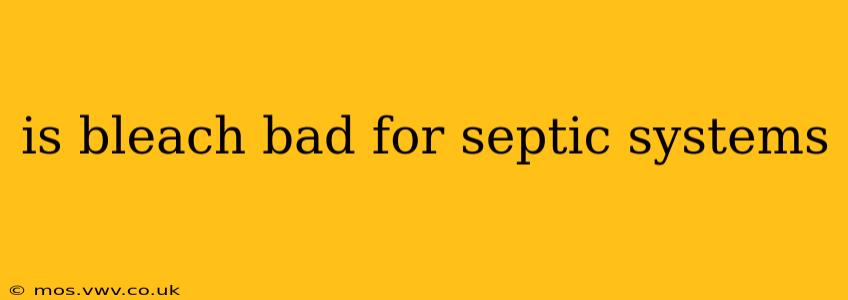Is Bleach Bad for Septic Systems? A Comprehensive Guide
Bleach, a common household cleaning agent, is a powerful disinfectant. However, its potent chemical properties raise concerns about its impact on septic systems. The short answer is: yes, bleach can be harmful to your septic system, but the extent of the damage depends on several factors. This guide will delve into the specifics, answering common questions and providing best practices for maintaining a healthy septic system.
How Does Bleach Affect a Septic System?
Bleach, primarily sodium hypochlorite, disrupts the delicate biological balance within your septic tank. This balance relies on beneficial bacteria that break down organic waste. Bleach kills these bacteria, hindering the wastewater treatment process. A weakened bacterial colony means less effective waste breakdown, leading to several potential problems.
What Happens When You Pour Bleach Down the Drain?
When you pour bleach down the drain, it enters your septic tank where it encounters the anaerobic bacteria responsible for breaking down sewage. These bacteria are extremely sensitive to chlorine. High concentrations of bleach can:
- Kill beneficial bacteria: This significantly impairs the system's ability to process waste effectively.
- Cause sludge buildup: Incomplete waste breakdown leads to an accumulation of solids, potentially clogging the system.
- Corrode pipes: While less common, prolonged exposure to high concentrations of bleach can corrode certain types of septic tank pipes over time.
- Produce harmful byproducts: The reaction of bleach with other organic materials can create harmful byproducts that can affect the environment.
How Much Bleach is Too Much for a Septic System?
There's no magic number, but the general rule is: avoid using bleach in significant quantities down your drains. Even small amounts regularly introduced can cumulatively damage your septic system over time. The impact depends on the size of your septic tank and the frequency of bleach use. A small amount of diluted bleach might have minimal impact, but regular use of concentrated bleach is highly discouraged.
What are the Alternatives to Bleach for Cleaning?
Fortunately, there are many effective and septic-system-friendly cleaning alternatives. Consider using:
- Baking soda and vinegar: This natural combination is excellent for cleaning and deodorizing.
- Borax: A naturally occurring mineral that’s a powerful cleaner and disinfectant.
- Enzyme cleaners: These cleaners contain beneficial bacteria and enzymes that help break down organic waste, aiding your septic system rather than harming it.
Can I Use Bleach to Clean My Septic Tank?
No, absolutely not. Never use bleach to clean your septic tank. Professional septic tank pumping and cleaning services utilize specialized equipment and techniques that don't rely on harsh chemicals. Using bleach in this context would likely cause irreparable damage.
How Often Should I Pump My Septic Tank?
Regular septic tank pumping is essential for maintaining a healthy system. The frequency depends on factors like household size, wastewater volume, and tank size. Consult a professional septic service provider for guidance based on your specific situation. They can assess your system and recommend a suitable pumping schedule.
What are the Signs of a Failing Septic System?
Recognizing the signs of a failing septic system is crucial to prevent costly repairs. Watch out for:
- Slow-draining drains: This is often an early warning sign.
- Gurgling sounds from drains: This indicates a blockage or backup in the system.
- Sewage backups: A clear indication of a serious problem.
- Foul odors around your drain field: This suggests wastewater is not draining properly.
If you notice any of these signs, contact a qualified septic system professional immediately.
By following these guidelines and choosing septic-safe cleaning practices, you can prolong the lifespan of your septic system and avoid costly repairs. Remember, prevention is key to maintaining a healthy and efficient wastewater system.
